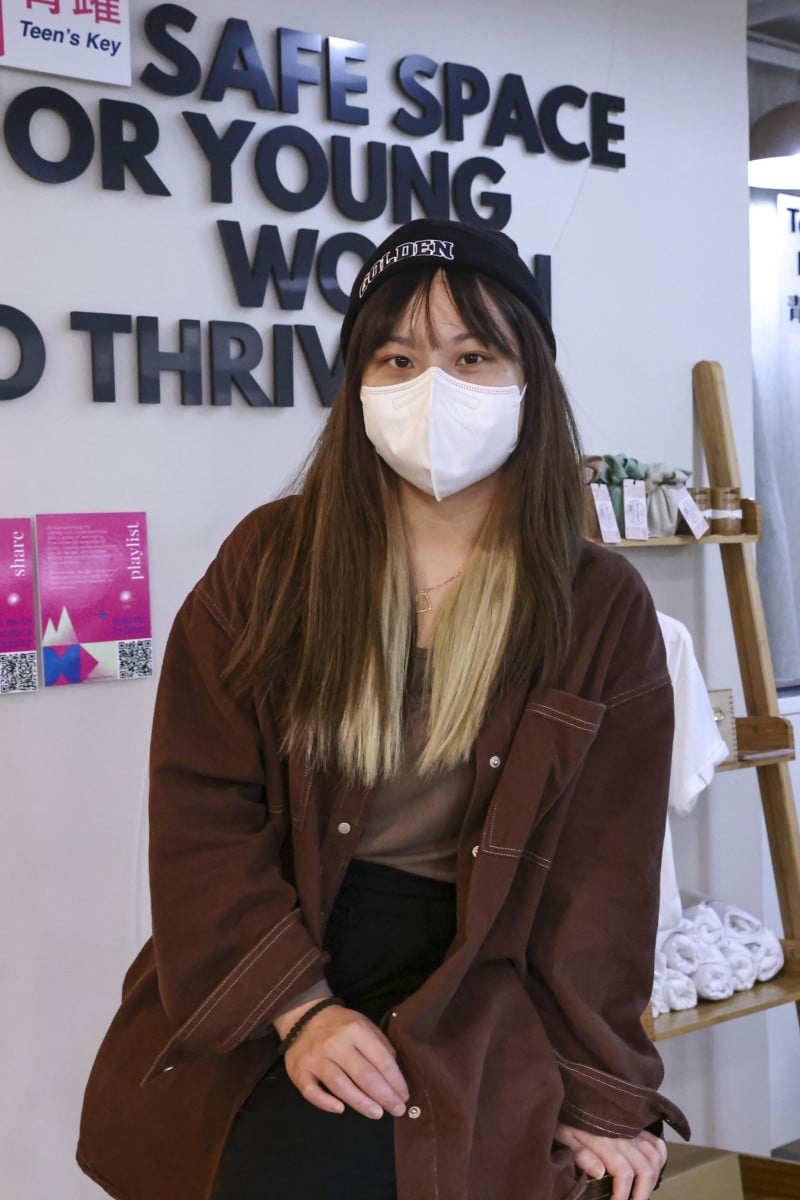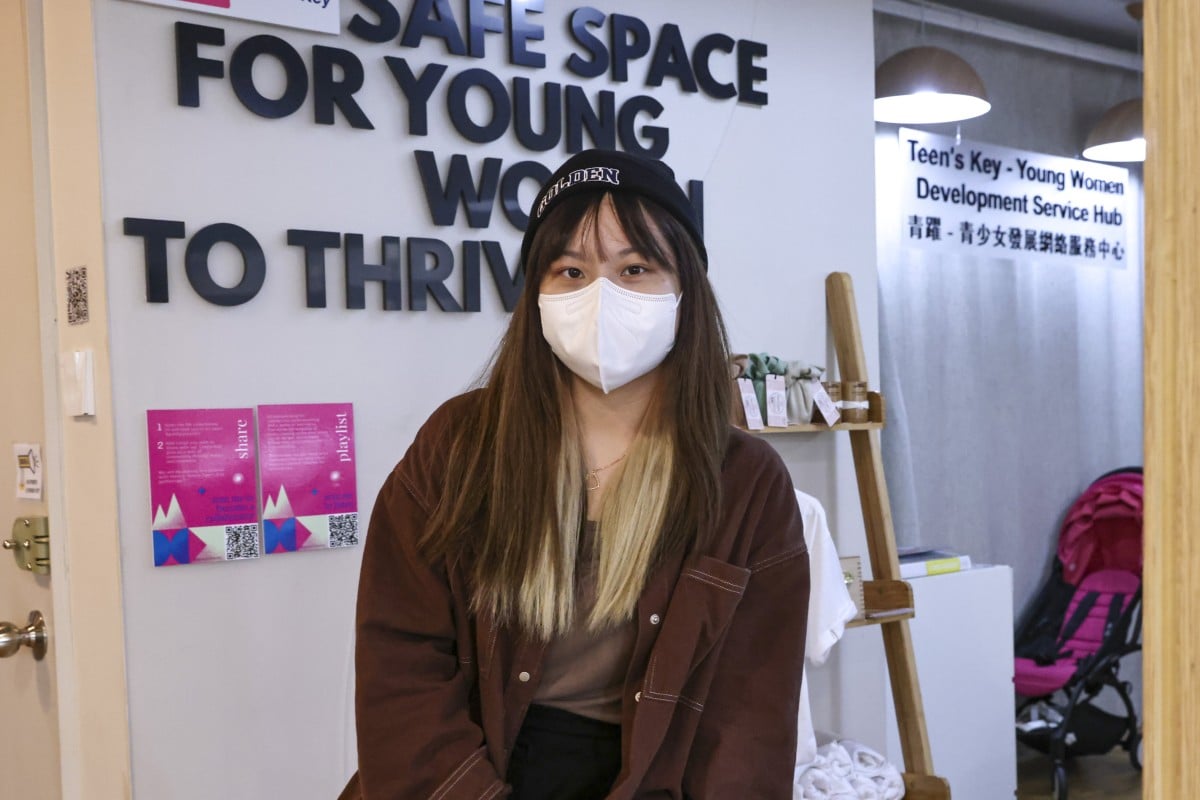
Why Hong Kong needs comprehensive sex education if it wants to reduce unplanned teen pregnancies
- A mother who became pregnant as a teenager recalls how little she knew about contraception as her school only offered a few lessons on sexual health
- Charity worker from Teen’s Key stresses how crucial it is for youth to be equipped with knowledge to make informed decisions about their bodies
 As a Teen’s Key ambassador, Mei Mei* often visits schools to share her story with youth. Photo: K. Y. Cheng
As a Teen’s Key ambassador, Mei Mei* often visits schools to share her story with youth. Photo: K. Y. ChengMei Mei* knew something was off when she missed her period.
At the time, she was only 19 years old and had just finished secondary school, so she panicked when her pregnancy test came back positive. While she told her boyfriend right away, the pair was so nervous about their families’ reactions that they did not reveal her pregnancy until she was five months along.
Speaking through a translator, Mei Mei, who is now in her mid-20s, explained: “I grew up in a traditional household, and my parents didn’t talk about topics like dating, sex or even periods.”
Thankfully, she had a good relationship with her mum and dad, and they took the news better than she expected.
“They weren’t angry. They calmly asked if I was ready for the responsibility of raising a child at such a young age,” she said, adding that her boyfriend’s family was also scared but supportive.
Students creating safe space for Hong Kong teens to discuss sex, LGBTQ issues
Though Mei Mei was still nervous, she felt more encouraged and decided to put off her plans to pursue a career in marketing. She married her boyfriend – who got a full-time job – and they moved in with his family as they prepared to have a baby.
It was difficult, she recalled, adjusting to motherhood, living in a different home and feeling isolated from friends, who supported her but couldn’t relate to her experience.
Of course, there were also happy moments: “To see your child growing up ... it’s very rewarding to see him smile and say ‘mummy’ and ‘daddy’,” she shared.
Reflecting on this time, Mei Mei said she wished she had known more about contraception. She had not been very knowledgeable about the topic since she only had two or three lessons on it in secondary school.
She added: “Those lessons were hosted by an outside NGO that came to campus.”
The organisation taught the basics of birth control but not where students could access it. Her school did not have a dedicated teacher or staff member to answer students’ questions about sex education.
The state of sex education in Hong Kong
Mei Mei’s lack of knowledge about sex education is not unusual; it is par for the course in Hong Kong.
A 2022 report from the Equal Opportunities Commission found that nearly one in seven Hong Kong secondary schools do not teach sex education in the classroom. About half of schools that cover the topic only devote around five hours to it per academic year.
Many do so during science or biology lessons, focusing on anatomy instead of offering a comprehensive overview of sex. According to the report, more than 80 per cent of schools said they struggled to make time for the topic because of a “jam-packed” curriculum.
Ansley Lee, a teacher and counselling mistress at Kiangsu-Chekiang College, agreed that it was difficult to make time for sex education.
“School time is jam-packed with various syllabuses, remedial classes, and other experiential activities ... giving sex education maybe the least attention and never the top priority for most schools in Hong Kong,” she said.
“Teachers have little understanding that sex education can be divided into different topics ... ranging from sexual health knowledge to awareness of values motivating healthy sexual decisions.”
Face Off: Should sex education be mandatory in Hong Kong schools?
The Family Planning Association’s 2021 Report on Youth Sexuality Study revealed students’ sexual knowledge to be “unsatisfactory”. Results showed that Form Three to Form Six students correctly answered an average of eight out of 12 questions on conception and sexually transmitted infections (STIs).
Rachel Chow, head of resource development at Teen’s Key, an NGO supporting the sexual and reproductive health of youth in Hong Kong, agreed that a more comprehensive approach was needed.
“The connection between a lack of sex education and teen pregnancy is a real no-brainer,” Chow noted. While NGOs like Teen’s Key can offer sexual health support, Chow stressed that schools must also do their part.
She added that when teenagers “don’t get proper sex education, they’re left in the dark about important stuff like sexual health [and] contraception ... They’re more likely to take risks and have unprotected sex.”
The charity worker explained that a lack of comprehensive sex education set youth up for failure: “The teens are playing a game without knowing the rules – not a good idea when it comes to something as important as preventing unplanned pregnancy, even sexual abuse.”
This has far-reaching effects on teens who have a baby before they are ready: “Completing their education, pursuing careers, and getting financially stable become way more difficult,” Chow said.
New beginnings
This is why Teen’s Key, established in 2011, offers preventive sexuality education, as well as free, anonymous testing for STIs, a 24-hour emergency helpline, crisis support and counselling.
“They need the knowledge and tools to make informed decisions about their bodies and future,” Chow explained, adding that truly comprehensive sex education stretched way beyond what schools currently offered.
Teenagers need to learn about topics such as “body image, relationships, intimacy boundaries, and discussions about consent and sexual violence”, she noted.
Teen’s Key also provides programmes to support young mothers, helping them to feel less alone and to plan for the future.
Sex education in Hong Kong: things you need to know, but were too afraid to ask
Now, Mei Mei’s son is school-aged, and she works part-time as an administrative assistant at Teen’s Key. She also serves as an ambassador, sharing her story at schools and companies.
Meanwhile, the charity recently launched an initiative called “Unlocking New Beginnings,” which raises awareness among youth about health and consent through interactive workshops for schools.
“By fostering dialogue and understanding, we can empower youth and debunk myths about sex and relationships for them to make informed decisions about their bodies and relationships,” Chow said.
It’s a message dear to Mei Mei, who has taken the mission to heart: “Every young woman should have the rights and knowledge to protect herself.”
*Name withheld at interviewee’s request.
